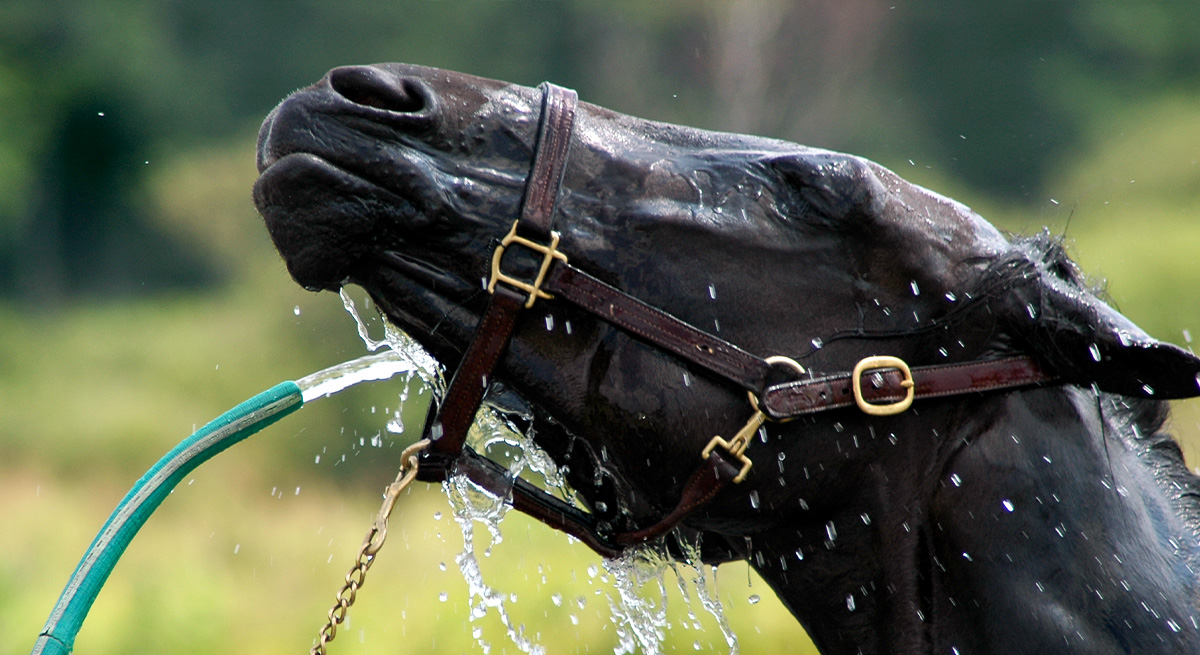Caring for Your Horse in the Heat
July 23, 2022
Excessive heat conditions come and go all summer long, especially here in the Northwest. But for your horse, even normal summertime temperatures can cause heat-related stress and other issues. We have some tips to help you notice the signs of heat stress, how to avoid it, and what to do if your horse gets overheated.
Watch for Signs of Heat Stress
Heat, humidity, the availability of water, and salt intake all play a role in a horse’s health as it endures summertime weather. Some of the other factors in heat stress include poor condition, not sweating normally, insufficient oxygen intake or exhaustion, intense exercise, and transporting during severe heat.Noticing any signs of heat stress can be tough when it’s a mild case. But, when your horse experiences severe symptoms,
- Higher-than-regular heartrate
- Aversion to exercise
- Seizures
- Sunken eyes
- Falling
- Stumbling
- Reduced skin elasticity
- Lack of interest in food or water
Take Special Care
For most of us, equines are a part of the family. So, take special care when they are showing signs of heat stress. First, try finding shade, offer water, give them electrolytes (if they are not drinking at all), and use a sponge to cool their legs, head, back, and neck. Be sure to scrape away any water that heats up significantly. Also, monitor their internal temperature. If it doesn’t fall below 101º F after these steps, call your veterinarian.
Coastal Tip: Create cool spots in your pasture with variously sized tarps. We have several sizes at your nearby Coastal location.
Salt for Good Health
Healthy horses require 1-2 ounces of salt per day and up to 6 ounces on days when they are working hard, enduring hot conditions, or both. If you find your horse licking the dirt or the wood on your tools or fencing, they could be in need of extra salt beyond what’s available in most feeds.
Choose either a salt block, like the Cargill Champions Choice from Coastal, or loose salt. Your horse will regulate its own intake, but if they are suffering from heat stress or boredom, they could overdo it and take in too much salt. Experts encourage horse owners to ration salt until the horse is no longer showing signs of craving.
Keep the Water Flowing
When the weather heats up, it’s important to offer your animals more water. Horses that are well-conditioned typically take in 1 gallon of water per 100 pounds of body weight. Do the math and you’ll quickly see that a 1,200-pound animal will drink 12 gallons of water every day.
A plastic trough or galvanized stock tank from Coastal is an easy way to keep your horse well hydrated all year long. Check out our articles on Stock Tank Basics and Repairs about proper watering and maintenance of your tanks.
Coastal Tip: horses don’t enjoy warm water, so try to keep your trough in the shade.
Coastal is Your Horse Headquarters
You’ll find aisles of saddles, tack, and hoof care products as well as a whole section of stock tanks at your West-Coast owned and operated Coastal. Stop by today, enjoy the air-conditioning, and get back to your homestead with everything you and your equine need to beat the next heat wave.
